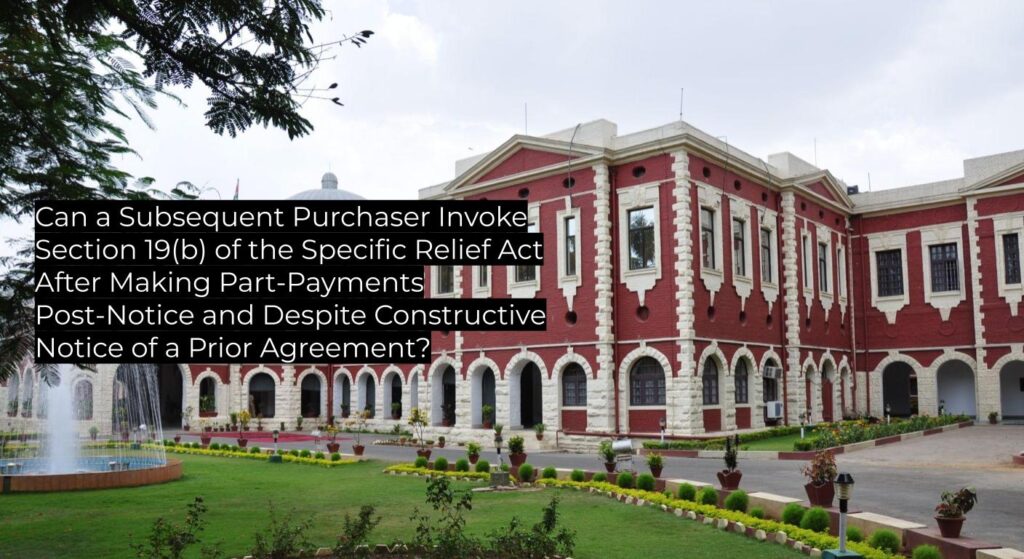The Jharkhand High Court holds that relief under Section 19(b) is unavailable if part consideration is paid after notice of a prior sale agreement or when constructive notice of that agreement exists. This decision overrules the first appellate bench, reaffirms trial-court findings, and establishes a binding Jharkhand precedent on bona fide transferee status in specific-performance suits.
Summary
| Category | Data |
|---|---|
| Case Name | SA/78/1999 of SOBHAGMALL JAIN Vs UDAY LAL SAHU And ORS. |
| CNR | JHHC010085471999 |
| Date of Registration | 15-09-1999 |
| Decision Date | 25-08-2025 |
| Disposal Nature | Allowed |
| Judgment Author | HON’BLE MRS. JUSTICE ANUBHA RAWAT CHOUDHARY |
| Court | High Court of Jharkhand at Ranchi |
| Bench | Single Judge |
| Precedent Value | Binding |
| Overrules / Affirms | Overrules first-appellate judgment; affirms trial court decree |
| Type of Law | Civil – Specific Performance; Specific Relief Act, 1963; Transfer of Property Act |
| Questions of Law |
|
| Ratio Decidendi |
|
| Judgments Relied Upon |
|
| Logic / Jurisprudence / Authorities Relied Upon |
|
| Facts as Summarised by the Court |
The plaintiff and vendor entered a 5.8.1979 sale agreement with a ₹1,000 advance and two-year window. Before its expiry the vendor sold to defendants 2 & 3 (registered 25.1.1980). Plaintiff issued a June 1980 notice and sued, alleging notice and part-payments post-notice. Trial court decreed; first appeal reversed; second appeal restored trial judgment. |
| Citations | 2025 JHHC 25223; MANU/JH/25223/2025 |
Practical Impact
| Category | Impact |
|---|---|
| Binding On | All subordinate courts of Jharkhand |
| Persuasive For | Other High Courts, Supreme Court |
| Overrules | First Appellate Court’s decision in T.A. No.27/88 dated 31.07.1999 |
| Follows | Sinna Ponnu & Ors. v. Singaru Odayar & Anr., 1968 SCC OnLine Mad 134 |
What’s New / What Lawyers Should Note
- Section 19(b) protection requires payment of the entire consideration before notice of a prior contract; part-payments post-notice do not qualify as “in good faith.”
- Constructive notice may be imputed from visible possession, vendor admissions in earlier proceedings, and deliberate non-inquiry or secrecy by the transferee.
- Uncontroverted pleadings of readiness and willingness, supported by a legal notice and deposit of the balance consideration on decree, satisfy Section 16(c) without pre-hearing tender.
Summary of Legal Reasoning
- Section 19(b) Interpretation: A bona fide transferee must have paid the full consideration in good faith and without notice of the earlier contract; post-notice part-payments cannot cure notice.
- Constructive Notice Doctrine: Under Transfer of Property Act s.3(ii), visible possession and vendor’s admissions, plus transferee’s deliberate non-inquiry or instruction to keep purchase secret, give rise to constructive notice.
- Genuine Agreement & Vendor Admissions: Vendor’s written statement in Title Suit No.69/80 admitted the 1979 sale agreement and collusion by her sons, supporting the plaintiff’s notice claim.
- Readiness & Willingness under Section 16(c): Uncontested averments, issuance of a registered notice, and deposit of the balance sum on trial-court decree demonstrate continuous readiness and willingness.
Arguments by the Parties
Petitioner (Plaintiff/Appellants)
- Defendants 2 & 3 had actual and constructive notice through plaintiff’s possession and vendor’s admissions.
- Part-payments after notice breach Section 19(b); full consideration wasn’t paid pre-notice.
- Plaintiff’s readiness and willingness, shown by pleadings, legal notice and deposit of balance, satisfied Section 16(c).
Respondents (Defendants 2 & 3)
- Denied knowledge of any prior agreement; sale deeds genuine and registered.
- Deferred payments are valid under Transfer of Property Act, s.54; registration vests title.
- Plaintiff’s bare averments of readiness and willingness insufficient without proof of fund availability.
Factual Background
In August 1979 the plaintiff and vendor entered a sale agreement for ₹40,000, with ₹1,000 advance and two-year window for conveyance. In January 1980 the vendor sold the same property to defendants 2 & 3 for ₹45,000 via two registered deeds. The plaintiff served a June 1980 notice and sued for specific performance, alleging defendants had notice of the prior agreement. The trial court granted relief, the first appellate bench reversed, and this High Court restored the decree.
Statutory Analysis
- Section 16(c), Specific Relief Act, 1963: Requires plaintiff to aver and prove readiness and willingness to perform essential terms; Explanation II permits deposit only when ordered.
- Section 19(b), Specific Relief Act, 1963: Exempts bona fide transferees who have paid their money in good faith and without notice from specific-performance relief against them.
- Section 3(ii), Transfer of Property Act, 1882: Defines constructive notice and the duty to inquire into apparent claims.
Alert Indicators
- 🚨 Breaking Precedent – Overrules the first appellate bench’s interpretation of Section 19(b).
- ✔ Precedent Followed – Follows Madras High Court’s Sinna Ponnu (1968 SCC OnLine Mad 134).
Citations
- 2025 JHHC 25223 (High Court of Jharkhand)
- CNR JHHC010085471999


